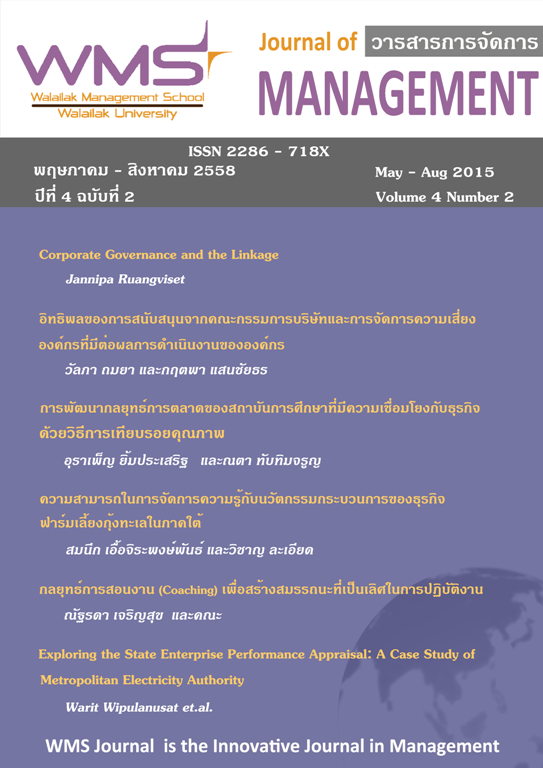The Effects of Encouragement from the Board of Directors and Enterprise Risk Management on Organizational Performance
Main Article Content
Abstract
Article Details
References
กรมพัฒนาธุรกิจการค้า, กระทรวงพาณิชย์. 2554. ระบบคลังข้อมูลธุรกิจ. สืบค้นเมื่อ 7 กรกฏาคม 2556, สืบค้นจาก http://datawarehouse.dbd.go.th/bdw/ search/search2.html
ฝ่ายพัฒนาธรรมาภิบาลเพื่อตลาดทุน. 2555. หลักการกำกับดูแลกิจการที่ดี สำหรับบริษัทจดทะเบียน ปี 2555. สืบค้นเมื่อ 10 กรกฏาคม 2556, สืบค้นจาก http://www.set.or.th/th/regulations/cg/update_p1.html
ไพร้ซวอเตอร์เฮาส์คูเปอร์ส. 2547. แนวทางการบริหารความเสี่ยง: ฉบับปรับปรุง - ตุลาคม 2547. [ม.ป.ท.: ม.ป.พ.].
ศิลปพร ศรีจั่นเพชร. 2555. คณะกรรมการ: กลไกของบรรษัทภิบาล. วารสารบริหารธุรกิจ, 35(136), 1-3.
Bagozzi, R. P., Yi, Y. 1988. On the evaluation of structural equation models. Journal of the Academy of Marketing Science, 16(1), 74-94.
Beasley, M. S., Clune, R., & Hermanson, D. R. 2005. Enterprise risk management: An empirical analysis of factors associated with the extent of implementation. Journal of Accounting and Public Policy, 24(6), 521-531.
Cameron, K. 2005. Organizational effectiveness: Its demise and reemergence through positive organizational scholarship. Working paper in M. A. Hitt and K. G. Smith (Eds.) Handbook of management theory: The process of theory development. London: Oxford University Press.
Chenhall, R. H. 2007. Theorizing contingencies in management control systems research. In C. S. Chapman, A. G. Hopweed, & M. D. Shields (Eds.). Handbooks of management accounting research. (pp. 163-205). Oxford: Elsevier.
Collier, P. M. 2009. Fundamentals of risk management for accountants and managers: Tools & Techniques. Oxford: Butterworth-Heinemann.
Committee of Sponsoring Organizations of the Treadway Commission [COSO]. 2004. Enterprise risk management-Integration framwork: Executive summary. [n.p.]: COSO.
Cunliffe, A. L. 2008. Organization theory. London: SAGE Publications.
Daud, W. N. W., Yazid, A. S., & Hussin, H. M. R. 2010. The effect of chief risk officer (CRO) on enterprise risk management (ERM) practices: Evidence from Malaysia. The International Business & Economics Research Journal, 9(11), 55-64.
de Zwaan, L., Stewart, J., & Subramaniam, N. 2011. Internal audit involvement in enterprise risk management. Managerial Auditing Journal, 26(7), 586-604.
Enterprise Risk Management Committee, Casualty Actuarial Society. 2003. Overview of Enterprise Risk Management. [n.p.]: Casualty Actuarial Society.
Epstein, M. J., & Rejc, A. 2005. Identifying, measuring, and managing organizational risks for improved performance. [n.p.]: Society of Management Accountants of Canada & American Institute of Certified Public Accountants.
Gates, S., Nicolas, J. L., & Walker, P. L. 2012. Enterprise risk management: A process for enhanced management and improved performance. Management Accounting Quarterly, 13(3), 28-38.
Gordon, L. A., Loeb, M. P., & Tseng, C. Y. 2009. Enterprise risk management and firm performance: A contingency perspective. Journal of Accounting and Public Policy, 28(4), 301-327.
Gupta, P. K. 2011. Risk management in Indian companies: EWRM concerns and issues. The Journal of Risk Finance, 12(2), 121-139.
Hair, J. F., Black, W. C., Babin, B. J., & Anderson, R. E. 2010. Multivariate data analysis: A global perspective. 7th ed. Upper Saddle River, New Jersey: Pearson.
Henri, J. F. 2004. Performance measurement and organizational effectiveness: Bridging the gap. Managerial Finance, 30(6), 93-123.
Hoyt, R. E., & Liebenberg, A. P. 2011. The value of enterprise risk management. Journal of Risk & Insurance, 78(4), 795-822.
Institute of Risk Management [IRM]. 2002. A risk management standard. London: IRM.
Kimbrough, R. L. 2006. The relationship between perceptions of organizational culture and implementation of enterprise risk management. Doctoral dissertation, University of Alabama in Huntsville, Huntsville.
Kimbrough, R. L., & Componation, P. J. 2009. The relationship between organizational culture and enterprise risk management. Engineering Management Journal, 21(2), 18-26.
Kleffner, A. E., Lee, R. B., & McGannon, B. 2003. The effect of corporate governance on the use of enterprise risk management: Evidence from Canada. Risk Management & Insurance Review, 6(1), 53-73.
Kline, R. B. 2011. Principles and practice of structural equation modeling. 3rd ed. New York, New York: Guilford Press.
Lekmat, L. 2009. Fostering corporate entrepreneurship (CE): An examination of the relationship between CE and firm performance in auto parts manufacturing firms in Thailand. Unpublished doctoral dissertation, Swinbeurne University of Technology, Victoria, Australia.
Liebenberg, A. P., & Hoyt, R. E. 2003. The determinants of enterprise risk management: Evidence from the appointment of chief risk officers. Risk Management and Insurance Review, 6(1), 37-52.
McShane, M. K., Nair, A., & Rustambekov, E. 2011. Does enterprise risk management increase firm value?. Journal of Accounting, Auditing & Finance, 26(4), 641-658.
Meulbroek, L. K. 2002. A senior manager’s guide to integrated risk management. Journal of Applied Corporate Finance, 14(4), 56-70.
Modaff, D. P., DeWine, S., & Butler, J. A. 2008. Organizational communication: Foundations, challenges, and misunderstandings. 2nd ed. Boston: Pearson.
Muralidhar, K. 2010. Enterprise risk management in the Middle East oil industry: An empirical investigation across GCC countries. International Journal of Energy Sector Management, 4(1), 59-86.
Nocco, B. W., & Stulz, R. M. 2006. Enterprise risk management: Theory and practice. Journal of Applied Corporate Finance, 18(4), 8-20.
Pagach, D., & Warr, R. 2011. The characteristics of firms that hire chief risk officers. The Journal of Risk and Insurance, 78(1), 185-211.
Phadoongsitthi, M. 2003. The role of managerial accounting in emerging economies: An empirical study of Thailand. Doctoral dissertation, University of Maryland, College Park.
Shenkir, W. G., & Walker, P. L. 2006. Enterprise risk management: Frameworks, elements, and integration. Montvale, New Jersey: Institute of Management Accountants.
Sobel, P. J., & Reding, K. F. 2004. Aligning corporate governance with enterprise risk management. Management Accounting Quarterly, 5(2), 29-37.
Subramaniam, N., Collier, P., Phang, M., & Burke, G. 2011. The effects of perceived business uncertainty, external consultants and risk management on organisational outcomes. Journal of Accounting & Organizational Change, 7(2), 132-157.
Tahir, I. M., & Razali, A. R. 2011. The Relationship between enterprise risk managment (ERM) and firm value: Evidence from Malaysian publice listed companies. International Journal of Economics and Management Sciences, 1(2), 32-41.
Tang, C. M. 2009. The role of information systems on organisational effectiveness of companies in Malaysia. Doctoral dissertation, Multimedia University, Malaysia.

